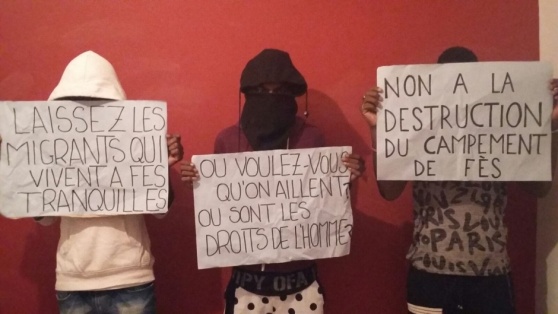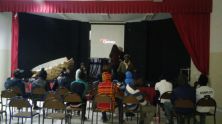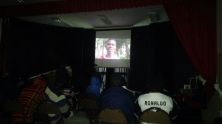Report Alarm Phone Western Med March/April 2017
Since the end of November 2016, the war against Subsaharan migrants in Morocco and Algeria has intensified. The Alarm Phone in Morocco is monitoring the situation on the ground in order to shed some light onto the tragic facts that have been caused by the repression of migrants: raid operations, arrests and mass deportations.
Everywhere, we witness the same facts: the violation of fundamental rights and abuses of all kinds: the theft of personal belongings (phones, bags, etc), the destruction of camps and material, the deprivation of food, and harassment.. These instances of violence cause forced displacement and maintain a situation of constent insecurity for Subsaharan migrants.
The operations for the deportation of Subsaharan migrants are multiplying. In Algeria, migrants are being deported towards the South, the Sahara, at the border with Niger and Mali. These deportations are carried out in inhuman conditions, migrants are abandoned without the minimum necessities for survival (food, water, etc). More than 1500 migrants were arrested in Ziralda (Alger).
In Morocco, deportations are carried out towards the Moroccan-Algerian border (Oujda region) and towards the South of the country. Several people we contacted after the raid spoke out about the violence they had suffered. This was confirmed by Algerian human rights organisations that reported these incidents.
Between November 2016 and February 2017, raids were carried out in the border towns and in cities at the centre of the country. During these raids, personal belongings were stolen (phones, money, luggage, etc). People remained blocked at the border in „buffer zones“, including a group of 47 people (men and women). Another group of 5 people, including one woman, tried to arrive on Moroccan territory but was arrested by the Moroccan authorities. These migrants have suffered from all kind of abuse as well as physical and psychological torture.
Thanks to them, the Alarm Phone has obtained testimony of the violence committed by the authorities between February and March 2017.
-
Mouhamadou, 24 years old, Ivory Coast: beaten and flogged which has handicapped the fingers of his left hand
-
Esseline, 26 years old, Cameroon: chased by the Algerian border guards although she was pregnant, she had a miscarriage.
-
Cedric, 16 years old, Cameroon: had to stay at the border in a military barack for three days, deprived of his luggage.
Raids and forced displacement: the drama at the Algerian-Moroccan border continues
The militarisation of the Algerian-Moroccan border increases the risks for migrants. Along the border, the Algerian authorities have dug trenches (3 metres long, 3 to 4 metres deep), and on the other side, Morocco has built an enclosed wall. The Alarm Phone has reported 3 deaths between the end of 2016 and early 2017, and several wounded (broken bones) because people fell into these anti-migrant trenches. Apart from that, the border guards have started shooting into the air in order to scare migrants and force them to take flight which can have serious consequences. Some of the mgirants who made it to Moroccan territory were in a bad state of health, physically and psychologically.
After the attempts at crossing the Ceuta fences, raids were carried out by the Moroccan authorities in the areas of Mesnana (Tanger) and Castellejo. These operations resulted in the arrest and the deporation of numerous migrants. Some were deported towards the Algerian-Moroccan border, others towards the centre of the country, towards Fes, Tiznit and Kenitra. These deportations were conducted in inhuman conditions. The Alarm Phone has received testimony of violence and intimidation that migrants had to go through. More than 20 national and international organisations, including the Alarm Phone, have publicly denounced these operations.
The Alarm Phone has followed up on the situation of a group of 47 deported persons, and another group of 5 people. Some of them have a regular residence permit. Some are minors, two of them were at the Protection Centre in Oujda during recent deportations. Among those deported to Algeria, some managed to come back onto Moroccan territory. A group of 5 people, including a handicapped women, found themselves in the buffer zone for more than 10 days without water and food. Alarm Phone has verified this information based on videos and photos.
Tangier – Tetouan in the North of Morocco: mass arrests and trials
Thanks to information we received from friends in Tangier, we learned that more than 100 migrants were arrested at the Ceuta fences and are currently in prison in Tetouan.
When several hundreds of migrants tried to cross the Ceuta fences in mid-February 2017, the Moroccan security forces have chased and arrested several migrants, including wounded people. For more than one month they have been kept imprisoned in Tetouan. The Alarm Phone has managed to contact some of them by phone. We learned that more than 100 mgirants are imprisoned and that they were on trial in Tetouan. However, it is likely that their number is even higher than the number mentioned. The trial took place in a record time frame: those who were arrested on the 19th, 20th and 21st of February were sentenced to 3 to 6 months in prison. These rash legal proceedings did not guarantee any fair trial. The accused did not have any means of defence. Some did not have access to the minutes and documents. Translations from the Arabic documents into other languages were not undertaken. The way the detainees were treated is inacceptable. The prisoners have denounced the discriminatory detention conditions (no right to receive visitors, no possibility to meet with human rights organisations, etc)
Consequently, the Alarm Phone Western Med:
-
expresses its support for the victims of this injustice and demands that all migrants accused of having “illegally“ crossed the borders be freed
-
denounces these unfair trials and the violation of the prisoners’ rights
-
calls upon the Moroccan authorities to respect human rights, guarantee better medical conditions and concede the right to receive visitors such as friends, if families and relatives cannot be present
-
calls for the respect of human rights at the Moroccan-Algerian and the Spanish-Moroccan border
-
emphasizes that this situation has been caused by European policies that are based on a strictly securitized approach
-
calls upon initiatives, organisations and individuals to support these political prisoners by denouncing the lethal European border regime and the lack of respect of human rights on both sides of the Mediterranean.















